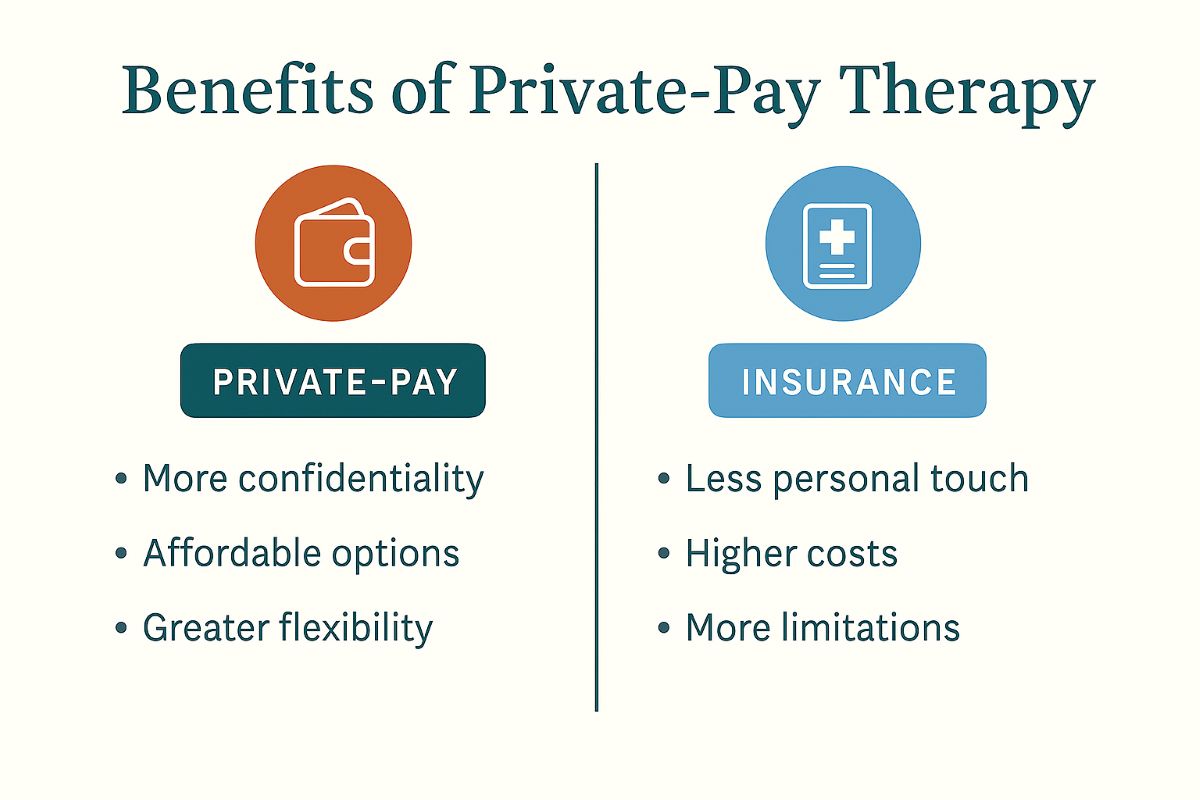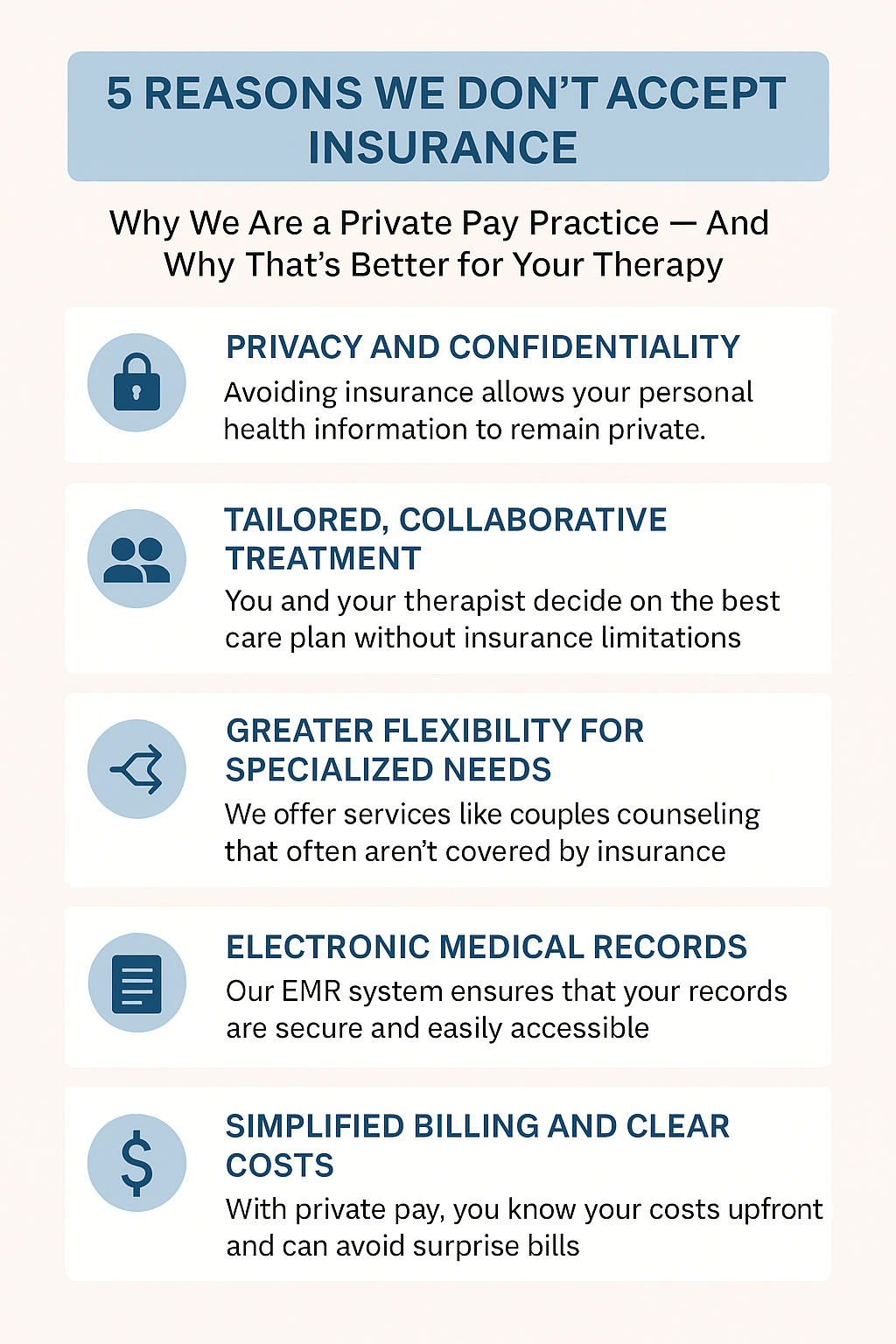If you’ve ever searched for a therapist in Savannah or Wilmington Island, you’ve likely seen the phrase “private-pay counseling.” You might wonder: Why would a therapist not accept insurance? Isn’t that more expensive? At Waters Edge Counseling we want to offer a clear, compassionate explanation of why we’ve chosen a different path, one we believe gives you more privacy, flexibility, and better care.
Founded by Licensed Professional Counselor Whitney Owens, with over a decade of experience and a strong commitment to privacy and evidence-based treatment, Water’s Edge is dedicated to providing the best options for clients across Georgia.
5 Reasons We Don’t Accept Insurance
1. Privacy and Confidentiality
When a third party is paying for your services, they may request access to your private information. This means someone who is not treating you personally, or may not even be a mental health professional, may review your documents to determine if they will be financially covering your appointments. By being private pay, we do not share your confidential information with anyone unless you sign off that you would like us to do so. We believe the fewer people who have access to your private information, the better. In addition, by not billing with insurance, there is no chance your information will be compromised if an insurance online breach occurs in their system.
Speaking of your private information, while in treatment, all clients are given a diagnostic code. Now, we know that might sound scary, but this is nothing to worry about. This code helps us know the best way to treat clients with evidence-based services to meet their symptoms based on the assigned diagnosis. But when billing with insurance, they make the decision if your diagnosis is severe enough for them to cover the sessions. Unfortunately, this can cause therapists to feel the need to overdiagnose to help clients gain access to treatment. Think of this as when you go to the medical doctor, you need a diagnosis of a pulled muscle to get PT services. In the same way, the insurance company wants to see that you are anxious enough or depressed enough to pay for treatment.
We take a different approach. We treat clients based on the symptoms and diagnoses that meet specific criteria. We do not feel the pressure to overdiagnose or to finish treatment sooner than we think is necessary. We can offer the evidence-based services that we think are best for you in the time frame that is recommended by science, and not a third-party payor.
By avoiding insurance, your personal health information isn’t shared with third parties, making therapy a more private and secure space — especially important if you or a family member needs a background check for careers like aviation or the military. Or, if your child is in therapy and is not sure yet what they want to do with their career. It is best to stay as confidential as possible, giving you control of your treatment and not the insurance company.
2. Tailored, Collaborative Treatment
Along with your diagnosis dictating treatment, insurance plans determine how many sessions you can have, how long they last, and what “type” of therapy is allowed. Insurance wants to save money by only covering as many sessions as they believe are necessary to fix your anxiety or depression, as if it is a one-size-fits-all.
At Waters Edge Counseling, we believe that your treatment plan should be decided by you and your therapist — not a billing department. Through a thorough intake process and ongoing treatment services, we understand you and your personal needs. We treat those symptoms specifically, regardless of what a third party would recommend. Private-pay gives us the freedom to offer the care that truly fits your needs.
3. Greater Flexibility for Specialized Needs
We serve individuals, children, and couples — and not all treatment fits into insurance codes. For example, insurance often does not cover couples counseling per se, but does cover family therapy. Unfortunately, insurance often pays a higher rate to providers who see an individual for therapy over a family or couple. Thus, therapists often see one person of the family unit or couple as the “identified client” and the other people in the room as those supporting the identified client by attending the session. Therefore, oftentimes one partner is diagnosed with a mental health disorder severe enough to justify treatment. This forces many therapists to “label” a client unnecessarily, misrepresenting the true purpose of relationship work. This can cause many problems, especially if the couple were to go through a divorce or records were to be requested. This puts one member of the couple in a very different situation from the other.
By staying out-of-network, we can treat both partners equally and ethically. We believe the couple is the client and not one member of the couple. We are fighting for your relationships as a unit.
To learn more about our relationship-focused therapy options, visit Couples and Family Counseling.
By choosing to be private pay, we focus on the client instead of the paperwork behind insurance billing. This allows us to put our resources into caring for you rather than a third party. You will recognize this when you call, as we have someone available to answer your questions or return your call within 24 hours. We are surprised how often we call a potential client back who says they are surprised to get a call. Sadly, some practices are so bogged down with insurance paperwork and billing that they cannot get back to clients in a timely manner.
4. Thoughtful Use of Electronic Medical Records (EMRs)
While we do use a secure EMR system to manage scheduling, documentation, and client communication, we are highly intentional about how your data is handled. Because we’re not required to submit information to insurance companies, your records stay private and are never shared with third parties without your consent. Our system is HIPAA-compliant, encrypted, and designed to protect your confidentiality at every step.
5. Simplified Billing and Clear Costs
With insurance, you may face co-pays, deductibles, pre-authorizations, and surprise denials. Unfortunately, this might mean ending treatment too early due to insurance refusing further sessions. Our approach is simple: transparent rates, upfront costs, and clear communication.
Understanding the Cost of Therapy
After reviewing the benefits of working with a private pay practice, you may be wondering about the financial side. At Waters Edge Counseling in Savannah, GA, therapy sessions typically range from $50 to $160, depending on your therapist’s experience and area of specialization. For those who need it, sliding scale options are available and can be discussed during your intake.
We believe that investing in counseling is investing in your long-term well-being. In fact, we frequently see that clients who make a personal financial commitment to therapy tend to engage more deeply and make faster progress toward their goals.
To explore how individual therapy may help you, visit our page on Individual Counseling.
How Does Private-Pay Counseling Work?
Private-pay counseling means you pay directly for your sessions, bypassing insurance entirely. While this might sound unfamiliar, it actually offers several advantages:
- You receive a Good Faith Estimate up front — no surprise bills
- You control your treatment without insurance limitations
- You can still request out-of-network reimbursement from your provider
Under the No Surprises Act, you have the right to receive a Good Faith Estimate for non-emergency services. This estimate must be provided in writing at least one business day before your session. If your final bill exceeds your estimate by $400 or more, you may dispute the charges. Learn more at CMS.gov.
Filing for Out-of-Network Reimbursement
Although we don’t bill insurance directly, many clients still use their out-of-network benefits. Here’s how:
- Pay your therapist at the time of service.
- Request a “superbill” from us — a document detailing services rendered.
- Submit the superbill to your insurance provider via their claims portal or mail.
- Wait for reimbursement, if eligible.
We’ll walk you through this process to make it as easy as possible.
Is Private-Pay Right for You?
Private-pay therapy works best for clients who:
- Prioritize confidentiality and control
- Want to avoid diagnostic labels
- Are exploring personal growth, faith-based therapy, or couples counseling
- Are seeking a deeper, personalized experience
We also offer specialized services for young people. If you’re looking for options tailored to children or adolescents, explore our Child and Teen Counseling services.
We understand that insurance can help make therapy accessible. If private-pay feels out of reach, please speak to us about sliding scale options or community resources. Our goal is to help you get the care you need — no matter how it’s paid for.
Ready to Begin?
Let’s talk. Whether you’re exploring therapy for the first time or returning for renewed support, Waters Edge Counseling is here to help.
- Meet Our Savannah Counselors
- Learn About Our Team
- Schedule a Session or call us directly at 912-319-5552
- If you’re closer to Wilmington Island, visit our Wilmington Counselors page to find care near you.
FAQs About Private-Pay and Insurance-Free Therapy
Can I still use insurance if I private-pay?
Yes. You can file for out-of-network reimbursement. We’ll help you with the documentation.
Why do therapists choose to be out-of-network with insurance?
To protect your privacy, avoid unnecessary diagnoses, and offer the most personalized care.
Is private-pay therapy more expensive?
Not always. When you consider co-pays, deductibles, and restrictions, private-pay can offer better value.
Is couples therapy covered by insurance?
Rarely. Insurance often won’t pay for relationship work unless one partner is diagnosed. We believe both people deserve support without medicalizing their relationship.
How do I file an out-of-network claim?
Pay for your session, request a superbill, submit it to your insurer, and wait for potential reimbursement. We’re happy to guide you through the steps.
What rights do I have under the No Surprises Act?
You are entitled to a Good Faith Estimate of costs and can dispute any bill $400+ above that estimate.


